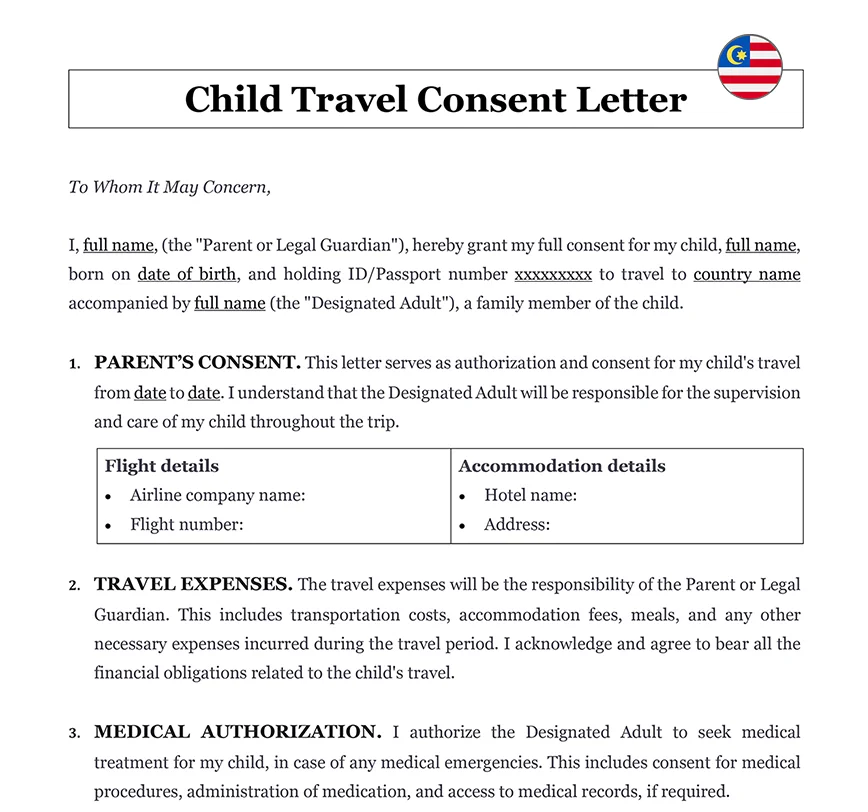Ready to use legal template
Drafted by experienced lawyers
Compliant with Malaysian law
Ready to use legal template
Drafted by lawyers
Compliant with Malaysian law
Home › Family law › Child Travel Consent
Learn more about Child Travel Consent in Malaysia
A Child Travel Consent is a legal document that grants permission for a minor to travel domestically or internationally without one or both parents or legal guardians. This consent letter is essential for ensuring smooth travel, avoiding delays at immigration checkpoints, and complying with Malaysian and international travel regulations. Airlines, border authorities, and government agencies often require this document to verify that the accompanying adult has the legal right to travel with the child, reducing the risk of abduction or custody disputes. Download our Child Travel Consent Letter, easy to edit in Word format, professionally drafted by experts to travel in and from Malaysia, ensuring compliance with legal requirements.
📄 Related documents
Table of contents
-
What is a Child Travel Consent?
-
Why is it necessary for international travel?
-
What should it include?
-
What are the legal requirements and regulations?
-
How can visa services assist in the process of obtaining it?
-
What if I don’t have it?
-
How does the process differ for domestic and international travel?
What is a Child Travel Consent?
A Child Travel Consent is a legal document that grants permission for a child to travel internationally without one or both parents or legal guardians. It serves as a means of authorisation and ensures that the child’s welfare and safety are protected during their journey. The consent typically includes important information such as the child’s name, passport details, destination, travel dates, and the contact information of the accompanying adult. This document provides proof that the child has the necessary permission to travel and may be requested by immigration authorities or airline officials. It plays a crucial role in complying with legal requirements and preventing potential issues, such as child abduction or unauthorised travel. It serves as a form of assurance that the child’s best interests are considered and upheld during international travel.
Why is it necessary for international travel?
Child Travel Consent is necessary for international travel primarily to ensure the child’s safety, prevent child abduction, and comply with legal requirements. When a child is traveling internationally without one or both parents or legal guardians, immigration authorities and airline officials may require proof of permission to verify that the child is authorised to travel with the accompanying adult. The consent document provides evidence that the child has parental or guardian consent, reducing the risk of confusion or potential legal issues. It also serves as a safeguard against child trafficking and abduction, as it helps establish the child’s legitimate travel arrangements and protects their rights and well-being. Furthermore, it demonstrates a responsible and compliant approach to international travel, aligning with the legal framework of both the departure and destination countries.
What should it include?
1. Child's Information
Full name, date of birth, passport details, and contact information (if applicable).
2. Parent/Legal Guardian Information
Full names, contact details, and signatures of the parents or legal guardians granting consent.
3. Accompanying Adult Information
Full name, contact details, and relationship to the child (e.g., aunt, family friend) of the adult who will accompany the child during travel.
4. Travel Details
Destination country/countries, specific travel dates (departure and return), and purpose of travel (if relevant).
5. Notarisation
It is advisable to have the consent document notarised or certified to increase its authenticity and legal validity.
6. Contact Information
Emergency contact information of parents/legal guardians and the accompanying adult, including phone numbers and addresses.
7. Supporting Documents
Attach copies of relevant identification documents, such as passports, for the child, parents, and accompanying adult, to further establish the child’s identity and the relationship between the child and accompanying adult.
- Remarks:
It’s important to note that specific requirements may vary depending on the destination country and the airline, so it’s essential to consult the relevant authorities or check their official websites for any additional documentation or specific format requirements.
What are the legal requirements and regulations?
The legal requirements and regulations for Child Travel Consent can vary depending on the country of departure, destination, and the nationality of the child. Here are some general considerations:
1. Age of Consent: Different countries may have different age requirements for obtaining child travel consent. It is important to be aware of the specific age threshold that determines whether a child requires consent to travel.
2. Consent Format: Some countries may have specific templates or formats for the consent document. It is advisable to check with the relevant authorities or consulate/embassy of the destination country to ensure compliance with their requirements.
3. Notarisation or Certification: Many countries may require the consent document to be notarised or certified to establish its authenticity and legality. This process typically involves having the document signed in the presence of a notary public or other authorised official.
4. Supporting Documentation: Depending on the destination country’s regulations, additional supporting documents may be required. These could include copies of the child’s birth certificate, passports for the child and accompanying adult, proof of relationship between the child and accompanying adult (e.g., guardianship papers), and any other relevant identification or travel documents.
5. Translation Requirements: If the consent document is in a language other than the official language of the destination country, it may need to be translated by an accredited translator to ensure understanding and acceptance by immigration authorities.
- Remarks:
It is crucial to research and understand the specific legal requirements and regulations of both the departure and destination countries well in advance of travel. Consulting with the relevant consulates/embassies, immigration offices or with one of our lawyers can provide accurate and up-to-date information on the legal requirements for Child Travel Consent.
How can visa services assist in the process of obtaining it?
Visa services can play a helpful role in assisting individuals with the process of obtaining Child Travel Consent for international travel. Here’s how visa services can provide assistance:
| ➤ Knowledge and Expertise: Visa service providers are well-versed in the visa and travel requirements of various countries. They can provide accurate and up-to-date information on the specific regulations and legal requirements related to Child Travel Consent for different destinations. |
| ➤ Documentation Guidance: Visa services can guide individuals on the specific documents needed to obtain Child Travel Consent, including the consent form itself, supporting documents, and any additional requirements. They can advise on the proper format, notarization, translation, and any other specific documentation requirements based on the destination country. |
| ➤ Application Review: Visa services can review the completed Child Travel Consent application and supporting documents to ensure accuracy and compliance with the relevant regulations. They can identify any potential errors or missing information that may delay or hinder the approval process. |
| ➤ Liaison with Authorities: Visa service providers can act as intermediaries and liaise with the relevant authorities, such as consulates or embassies, on behalf of individuals. They can help facilitate the submission of the consent documents, address any queries or concerns, and provide updates on the application status. |
| ➤ Time Efficiency: Visa services are experienced in navigating the application process efficiently, potentially saving individuals time and effort. They can provide guidance on the necessary timelines and ensure that all required documents are submitted in a timely manner. |
What if I don’t have it?
If you don’t have a valid Child Travel Consent when required, it can potentially lead to complications and travel disruptions. Immigration authorities and airlines may request proof of consent, especially when a child is traveling internationally without both parents or legal guardians. Without a valid consent document, you may be denied boarding or face delays at immigration checkpoints. Additionally, not having the necessary consent could raise concerns about the child’s safety and welfare, potentially leading to involvement from child protection agencies or legal authorities. It is essential to comply with the legal requirements and obtain the required Child Travel Consent to ensure smooth and hassle-free travel, protect the child’s rights, and prevent any potential legal or logistical issues.
How does the process differ for domestic and international travel?
The process for obtaining Child Travel Consent can differ for domestic and international travel.
In domestic travel within a country, the requirements for consent may vary depending on local regulations and airline policies. Some airlines may require consent for a child traveling with only one parent or guardian, while others may not. It is important to check with the specific airline and local authorities to understand the requirements.
For international travel, the need for Child Travel Consent is more stringent. Most countries require consent documentation when a child is traveling internationally without one or both parents or legal guardians. The consent document may need to be notarised or certified, include specific information about the child, the accompanying adult, and travel details. It is also essential to consider the requirements of both the departure and destination countries, as they may have different regulations regarding the document.
Child Travel ConsentTemplate (.docx)
Easy and quick to customize
310 client reviews (4.8/5) ⭐⭐⭐⭐⭐
Share information
Why Themis Partner ?
Make documents forhundreds of purposes
Hundreds of documents
Instant access to our entire library of documents for Malaysia.
24/7 legal support
Free legal advice from our network of qualified lawyers.
Easily customized
Editable Word documents, unlimited revisions and copies.
Legal and Reliable
Documents written by lawyers that you can use with confidence.




